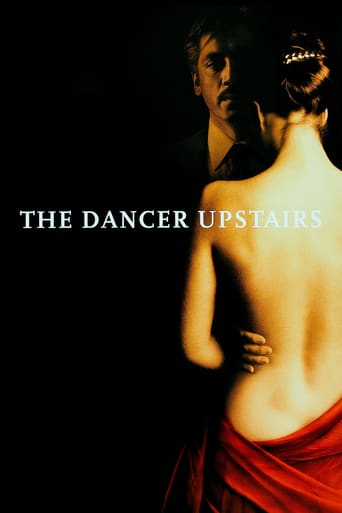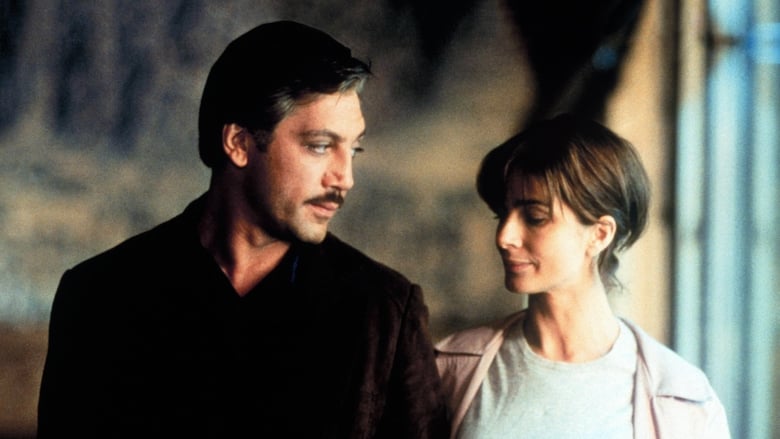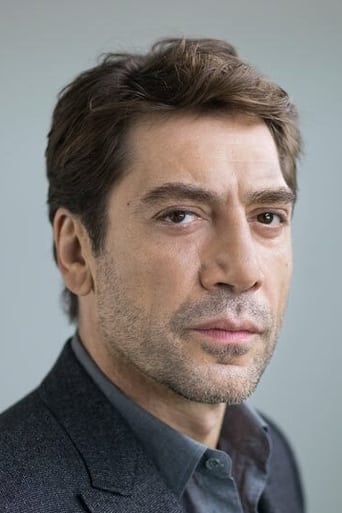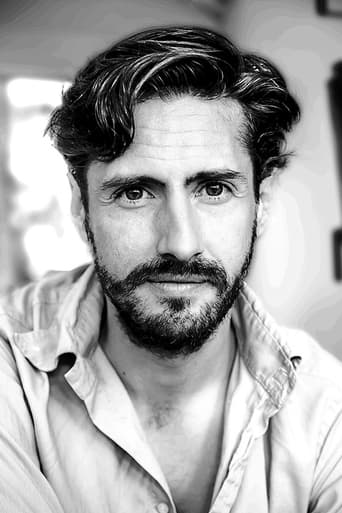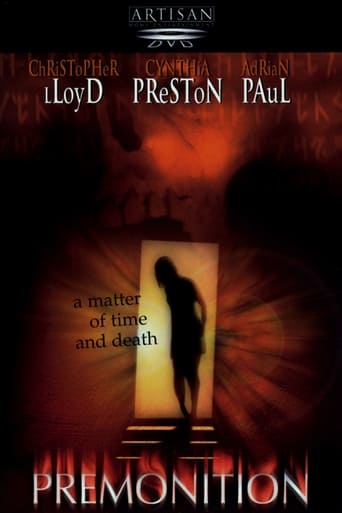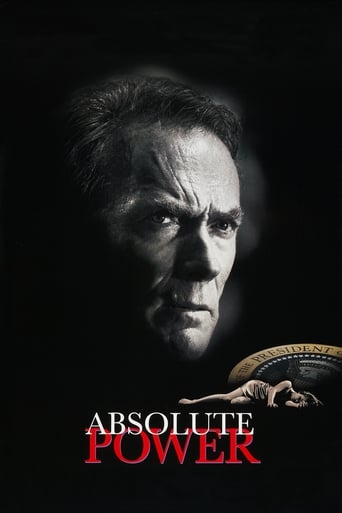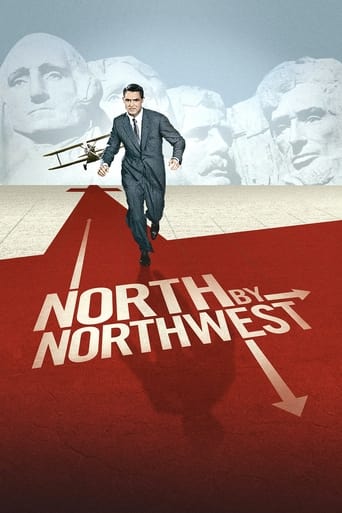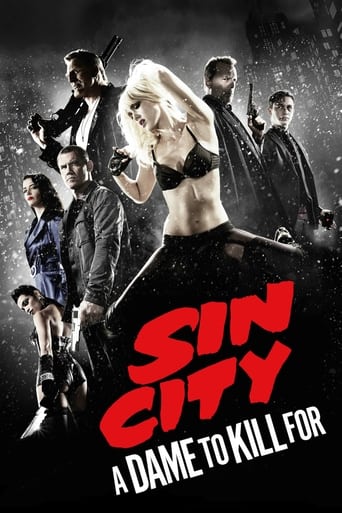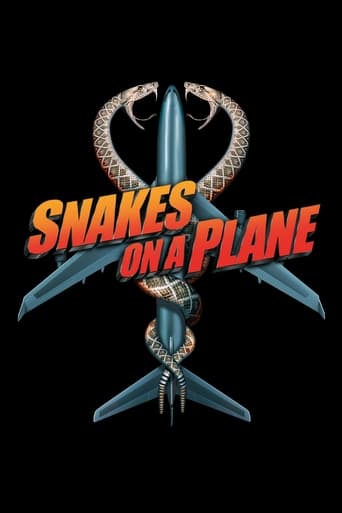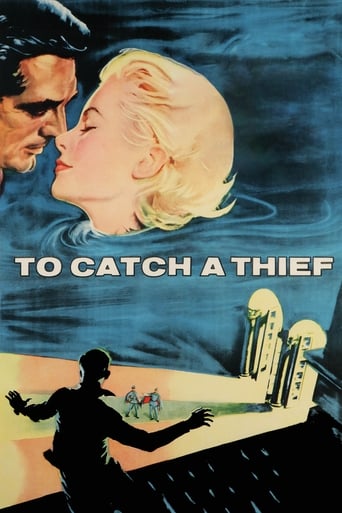The Dancer Upstairs (2003)
A police detective in a South American country is dedicated to hunting down a revolutionary guerilla leader.
Watch Trailer
Cast


Similar titles
Reviews
Initially wanting to give this a higher mark, I seem to have settled for seven stars. I could have been influenced by some of the other reviews, although a number of them are exceedingly obtuse. Dogs die, and any city can supply a few dead dogs over the weeks it takes to shoot a film. Objections to the language seem equally misguided. Stories by English writers are written in English for their audience, even when set in different countries and different times. Should Gladiator have been acted in Latin, or Troy in Ancient Greek, The Duellists in French, Dracula in Transylvanian ? The DU is well-acted, and interestingly written, although somewhat predictable. Nevertheless it seems to need tightening, and this may be because of the relative functional inexperience of both director and script-writer. It wavers between corrupt politics and doomed romance. In essence it appears to be presenting the dilemma of the decent man, played by Javier Bardem, torn between living a moral life, an unsatisfactory marriage, and the everyday necessity of having a career sufficient to support his child. The artificial deal in the final scene about relinquishing the prospect of becoming president seems exceedingly unrealistic, although it also seems a convenient way of resolving this policeman's character. Ballet and cosmetics, the occupations of the two women in Bardem's life, are minimally brain-demanding.
In 2002 we are at the turning point of out understanding of what violence used for political objectives is: not revolution at all of any type, just plainly terrorism. But in These years of the beginning twenty-first century we were inheriting a whole set of misconceptions and deeply rooted movements all over the world that had been inspired by various brands of Marxist revolutionary tactics and strategies from the past. If you add to this set of Marxist or Maoist revolutionary movements the newly constituted al-Qaeda movement on a completely different ideological line but borrowing the methods of the previous movements plus some more spectacular ones, you have the situation around 2000-2002. But it is a turning point in history that some will try to use to their political and electoral benefit if not profit, particularly in the USA. These radical theories and uses of violence to impose a change that is then, if not at once, hijacked by some power hungry people or movements are coming to an end. The world has changed and the technology of information and intelligence collecting and processing has changed so much that there is practically not one single spot in the world where anyone, not to mention a movement of any kind, can hide for long periods of time. If Bush had not tried to force history in Iraq after Afghanistan things would be a lot better today, but as I said before some could not resist playing politics with history. That will not change the outcome but that will slow down the process.This film is dealing with that anti-terrorist action that has to be managed case by case, one after the other. There is not one single method for all cases but there must be one specific method for each case. Here we are in the Andes, probably in Peru where the fight is against the Shining Path Rebellion that organized hundred of small terrorist actions with a limited underground apparatus and a very limited number of leaders totally isolated or rather insulated against any security intelligence, or at least, so they say or think. The method in this case is to track these leaders and little by little surround them and take them in one single operation; As soon as the movement is totally beheaded it peters out because there is no second line commanding unit that can take over. Totally different would Al-Qaeda be because the top leadership has several hierarchical layers and it has been decentralized in the world with several regional, at times even local leaderships. To behead the top movement does not stop it because a new well trained leader steps into the shoes of the lost leader. And in the world the various regional branches are autonomous. Then they have to be weaned and their weapon or ammunition supplying routes have to be dried out or destroyed. It takes more time. Gaddafi's regime was brought down and he was a main provider of weapons to a whole set of movements and countries around Libya, but the arsenal was not destroyed or captured and then it moved across the desert and reappeared in Algeria, in Mali, now in Chad and Central Africa, probably in Sudan too, though it does not seem to go further. This explains why destroying the arsenal, chemical weapons first, of Syria is important. If it fell in extremist hands it might be used in any reckless way.If you take the case of Sri Lanka, nothing was possible when the ceasefire was broken in 2006 if the sea was not under control. The USA provided the Sri Lankan government with the information that enabled the armed forces, navy and air force to sink all the ships that were supposed to supply the LTTE, an old Maoist-inspired movement. Then they had to control the sky and that was done by the destruction of the only important air strip the LTTE had. Planes and pilot training were provided by Ukraine and Russia. It was also necessary to have some satellite surveillance to track all movements and concentrations of vehicles and personnel on the ground, under the canopy of jungle vegetation. Though it has not been so far acknowledged, it is probably China who provided that support. And yet it took three years to defeat LTTE terrorism. In Nepal the Maoist movement re-entered the political arena with a compromise that eliminated the feudal monarchy. In Myanmar the military dictatorship had to be pushed aside and democracy reestablished. That was done in a couple of years this time with strong international support of not pressure. In these cases it is the economic incentive that was the motor of such changes. The Chinese need to close up the violent Maoist movements in the world that are incompatible with their policy, their public image and the main commercial routes they want to re-open: the one across Tibet needs peace in Nepal. The one through Myanmar needs democracy there. In the same way some entrenched communist, or ex-communist regimes have to open up to market economy to simply survive or remain independent. Laos is changing because of the enormous amount of electricity they now produce and mostly export, which gives them the money they need to develop the economy. Vietnam has to move fast along that line to follow the trend in Asia and to be at the spear head of the Association of Southeast Asian Nations (ASEAN). Even Thailand has been obliged to find a compromise to stabilize their politics. [...]That's what is behind this film, at least one case, and it is interesting to see it since the Shining Path Rebellion has been defeated in the meantime. So enjoy the film. The sound is not very good due to the cultivation, of some rather fake English accent to sound realistic in Latin America. Dr Jacques COULARDEAU
For the way they move my soul, i think films fall into 3 categories: -those that make me indifferent, unable to push any of the buttons that stimulate my mind and emotions, the worst kind; -others just punch you in the stomach, they just shock you, force you to face situations without making you really dig into its core; -the best kind of film move everything inside you, make you discover parts of your soul you didn't know to be there. They grab you where it matters, and lead you to uncharted territories;I would never guess that this film would fall into the third category. But it does, despite its flaws, which are not few. For his work as an actor i always thought Malkovich was an interesting person. There is a kind of disturbed lucidity that overshadows even his loudest commercially oriented interpretations. Also, if you check is role choices, he is one of those guys who gets into crap projects to make a living, and than finds time to work in things that motivate him. That's why we have 3 participations in Oliveira's films. Here he tried directing.On the surface, the story is a bad choice. How and what happens is uninteresting, predictable and even incoherent. But there is something great: we are led into thinking we will watch a political thriller, high conspiracies that affect the lives of small people. The lonely hero who will do the right thing. Having not read the book, i'm guessing it points that way. The beginning of the film gives that impression as well. But than Malkovich deceives us, and smoothly pushes us into a deeper layer of personal emotions, of character development through people's relations. In the end, this is a story about an interesting character caught up in a corrupt shallow world, who makes his way into trying to live an honest life, "looking for a more honest way to practice the law". A little bit like Malkovich's career. We have that character beautifully played by a highly focused Bardem, a very interesting method actor. His character lives polarized by three women, his empty headed wife, his dance oriented daughter, and her troubled dance teacher. How he swings among them is what matters. For how the political background intersects Bardem's emotional life, i think the story helps, but i found it a major flaw that Malkovich wasn't able to make us understand when we should really give up on the (after all) useless thriller and focus on what he sure wanted to do, which was to center us on the head of Bardem's character. I know Malkovich wanted it better, but hey, this was only his first try.The direction is uneven. We have some poorly edited dialogs which work against the actors and the fluidity of the story, and some bad choices in the scene sequences that perturb the understanding of the plot. Basic mistakes. Worse than that, some times Malkovich looses the grip and let's us, spectators, wandering about where to go next. This tense and concentrated film requires a gripping direction which Malkovich doesn't deliver consistently. But we also have pieces of honest pure and beautiful cinema, which include performances. Among these we have a dancing lesson, inter cut with the murder of three people in a theater performance, having the audience take those executions as a part of that performance. And we have the very final scene, a performance of the child, with Bardem rushing to get there. Those and other bits were truly powerful, sincere and moving. Should we have this consistency through all the film, and we'd have something really powerful.There is something particularly well done: the locations. Malkovich is known to be around Portugal often, so i imagine he chose personally most of the locations. Anyway, they always add to what he tends, they are a permanent character that en forms what we are supposed to see. In this specific point, the film is consistent all the way. I'm guessing a lot of time was put into choosing the places.My opinion: 4/5 there is a true soul behind this, despite its flaws as a film.http://www.7eyes.wordpress.com
I read a lot of reviews of this film, and only in a few places did I see any mention of a bizarre choice director John Malkovich made: it's set in Latin America, yet everyone speaks English with a Spanish accent. No reason is given for this, even by Malkovich himself in the DVD extras.I found this whole linguistic silliness disconcerting, jarring and disruptive, and it throws the film's credibility to the winds. I just cannot suspend disbelief when I see this on the screen. It rarely happens any more, and for good reason.It just makes no sense to have people speaking English with Spanish-and-Italian-inflected accents, while songs, newscasts, background chatter, newspapers and posters are heard and seen entirely in Spanish. It's a weird decision, and it flat-out sabotages the entire film. This kind of stuff used to be done routinely in the 1940s and 1950s with pretty laughable results (Nazis scheming to blow something up while they're all speaking to each other in sinister, cackling, heavily accented English).I'm not surprised by anything Malkovich does. He's a self-styled professional eccentric who has gained a reputation as a great actor, or perhaps artist, which is a term he would probably prefer. I've always been frankly puzzled about the buzz surrounding this guy. Down to his aristocratic, halting, midwestern (let's face it -- creepy) speech patterns, he's about as charismatic as a walnut.He's also a poster boy for pop culture's right wing, which used to be the property of people like Charlton Heston. He doesn't believe in extending time, patience or understanding for revolutionary left-wing movements, and he demonstrates it vividly in this film. I cannot help but feel that Malkovich, given his political stance, made this film as more of a statement than a work of art (which it isn't).The Dancer Upstairs is a sometimes intriguing film done in an often familiar American-style manhunt style. What's glaringly missing is any discernible background to the spectacular (and terrifying) rise of Peru's Shining Path movement (1980-92), upon which the film was based. Malkovich shows us instead a lot of footage about the hunt for the enigmatic leader of the group. Forget that the Maoist Shining Path gained so much popularity among the masses that it almost overthrew the government. If you want to know why they gained this popularity (and STILL do in some parts of Latin America), don't look to this film for answers. It's too busy with the Cult of the Personality (i.e. the leader of the group -- a solitary individual). Something very American about that. What you'll see here are a lot of crazed terrorists blowing things up real good, because, well, in Malkovich's eyes, all terrorists are crazy. End of story. I watched this movie because I'd walk across coals to see Italy's Laura Morante; both she and Spain's Javier Bardem are magnetic screen personalities. Morante is so sexy; she has a gorgeously sweet, emotive and VERY feminine face. She and Bardem team up very well here, despite more than a few lapses with dialogue that is stilted and unnatural (and for good reason: they're speaking in their second, third or perhaps even fourth language). To make matters worse, the dialogue is often American-style colloquial. Go figure. So many times, the spoken rhythms of the characters just fall flat on the screen.Not a bad movie, if you can concentrate on the visuals and the pacing and try to forget that you're supposed to suspend disbelief. Alas, it falls on its own linguistic sword, a victim of Malkovich's obsession with being different.

